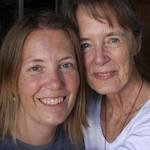
Monday for Mom was splat day. She was working on splats up until her last few days. We talked about the splatforms a lot in her last few months. About a week ago she asked if I would write a splat about what it is like to be splat adjacent. This is what I came up with and she scheduled it for today not really intending it to be a last splat in this format. I’m posting it today in her honor. One thing I tell my students is, it’s not the mess we avoid that makes us a weaver, it’s how we get out of the mess that defines our work.
__
Years ago my mom and I were interviewed for the radio program, This American Life, regarding an incident that happened when I was about ten years old. Mom would have been thirty at the time. The show had something to do with shared memories and how different they can be. Thirty years had passed since the incident—returning home from a family road trip to find our brood of pets in complete disarray, including a drowned hamster and a missing boa constrictor. Our versions of the story were drastically different. The interview never ran and I can’t tell you now how the two versions didn’t square, because they have become blended in my memory.
I can track every single argument between my mother and I to the certainty of memory and the assertion that we each are right. The truth is we are probably both right and a little bit wrong. Over time we have let each other live with our own version of events, occasionally being able to bridge the two and create a new memory.
That is the thing about memory, it is completely unreliable, science tells us it is so. Our experiences become reshaped as we reflect, revise, and revisit. What we make from them depends on what we want to make from them. Memory has a point of view that is unique.
These splats of my mom’s are not journalism, they aren’t a reporting on agreed upon facts, but a collection of thoughts that go whizzing past her mind’s eye as she is dying. She plucks them from the air and shapes them into a narrative meant to leave the reader with an impression like a painting. To do this, some things must be left out and some things are written in—one string pulled and one left alone.
The first time I saw a splat appear on Facebook, I thought “What the hell?” I remind her that these impressions are not just hers alone. There are others who also share these experiences, walking side-by-side to her tales are other people’s memories.
When Mom talks passively about suicide attempts, I remember the bright lights of the waiting room corridor. When she speaks of being arrested for disorderly conduct, I remember sleeping in my car because I just didn’t know where else to go. She writes of my blue eyes, yet they are green. Storytelling that isn’t wrong, but it isn’t always right. Anyone who has lived with or known a writer knows what it is like to live in that duality. It is maddening and it is what it is. She is what she is.
There are my own joyous memories that spring to mind when I think of my time under my mother’s care, the custodial years. Roaming regularly among the looms on the occupational therapy unit of the psychiatric ward of the University of Virginia hospital where she worked for a time, living in a dressing room at the Albemarle Playhouse, cast parties with giant champagne fountains, a hammock for a couch that eventually destabilized our living room walls, my play shelf in the kitchen of Martha’s Cafe where I could cook up my own specials, the annual baking of 2,500 chocolate chip cookies for the Messiah sing-in at the Rotunda, and family vacations to mountains, lakes, rivers, and oceans.
Mostly, I remember my ten plus years embedded on Elliewood Avenue in my hometown of Charlottesville, Va., where Martha’s Cafe was located. I channeled the spirit of the young Ellie Wood Paige for whom the street is named, although I didn’t know it at the time. Ellie’s mother ran a boarding house on the then unnamed, unpaved side street and little Ellie befriended so many folk in the general vicinity it became known as Elliewood. I feel the echo. It is a street with mystique.
In my coming-of-age years, the late 1970s and early 80s, the independently-minded owners of bike, book, comic, candy, soap, bead, and record stores, eateries, and one odd preppy clothing store called Gee I’m Glad I’m Female, were a great lot to tuck in with. They embraced me and my roller skates bopping in and out of their spaces, giving me odd jobs, tolerating me and my best friend taking up table space to play backgammon, and including me in adult conversations. Memories I haven’t thought of in years. Splat.
I wandered the halls of this adult world largely through one confusing bizarre lens, my mother’s life. There were large parts I spent away from her, either in my own feral existence or with my biological father in the country, but no matter where I went her presence loomed large. I was Martha’s daughter. I fled west to be my own person. Just before I drove off she shoved a cassette of Guy Clark’s Old Friends in my hands and waved goodbye. I’ve talked to her nearly every Sunday since then.
In the end, when it comes to storytelling we have a responsibility to ourselves and our readers to give an honest treatment of the material as we understand it. The whole story is never told, partly because not all stories are for us to tell and because the story would suffer from the tedium. To spend a lifetime working at your craft is a life well lived. When the big sleep arrives, may we be faced with our own splats whizzing by for a life lived and not ignored.

Share this post with your friends.

